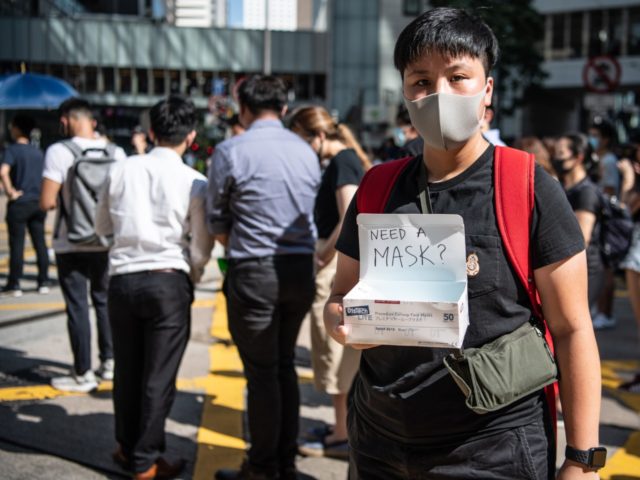Hong Kong Chief Executive Carrie Lam’s first move since returning from a trip to Beijing was to ban individuals from wearing face coverings on Friday, including both masks and face paint.
The mask ban is a response to the Hong Kong pro-democracy protest movement, whose members often wear masks to conceal their identity from police or to protect themselves from the widespread use of tear gas against typically peaceful crowds. Lam invoked British colonial powers to enact the ban, using the city’s Emergency Regulations Ordinance (ERO) for the first time in half a century.
Hong Kong’s government, controlled by the Communist Party of Beijing, insists that the protest movement is violent and requires extreme measures to subdue. The protest movement – a loosely organized pro-democracy coalition that has attracted nearly 2 million people of the 7 million living in Hong Kong to its biggest marches – insist on using peaceful means to make their five demands to the government. Lam promised the withdrawal of a proposed law that would allow China to extradite anyone present in Hong Kong if the Communist Party desired it, yielding to one of the five demands.
Protesters are also demanding the right to elect lawmakers, an independent investigation into police brutality, an end to the government calling protesters “rioters,” and freedom for political prisoners.
Police brutality escalated to an unprecedented level on Tuesday, the 70th anniversary of the communist takeover of China, when an officer shot a teen protester in the chest, piercing his lung. The protesters, Tsang Chi-king, is reportedly in stable condition after surgery to repair the damage. The bullet missed his heart by three centimeters, according to reports from the city.
Lam blamed this violence on the protesters and said on Friday she hopes the mask ban will empower the police.
“The decision to enact an anti-mask law is not easy one, but it is a necessary decision considering the situation today,” Lam said at an event announcing the new law. “In the past four months, we’ve seen that all protesters that have carried out vandalism have covered their face. They’ve become more and more daring, so we believe the regulation on face covering is appropriate.”
Lam insisted that the situation in Hong Kong “satisfies this [ERO] requirement of endangering public order” but that, despite satisfying the requirements of the state of emergency law, Hong Kong was “not in a state of emergency.”
“As more and more young people take part in riots, we hope this new regulation would deter young protesters and keep them away from violence,” she explained. “It is our objective to de-escalate the violence, but we are not absolutely sure violence would end. Government and law enforcement agencies are taking action. We appeal to society to help us end the violence.”
Lam denied that she had discussed the law with senior Communist Party officials in Beijing, where she traveled Tuesday for its annual celebration of communism.
The new law prohibits all masks and face coverings, including paint, at “illegal” assemblies against the government, subject to a fine of HK$25,000 ($3,187.87). It allows for exceptions for medical or religious masks, or masks necessary during the regular course of some jobs, leaving the door open for Hong Kong residents to wear niqabs or surgical masks if they have been diagnosed with a communicable disease. The law bans both full and partial face covering.
The legislation took effect on Friday at midnight local time. Thousands took the streets wearing face masks in defiance of the law.
The law came into effect shortly after the Hong Kong Free Press (HKFP) reported that police broke records on tear gas usage on Tuesday, attempting to quell protests that would embarrass Beijing on its biggest holiday. Police reportedly fired 1,400 tear gas canisters and made 269 arrests, the most in one day. The victims imprisoned ranged from ages 12 to 71 – including 18-year-old Tsang, who faces charges of rioting and assaulting a police officer while recovering from his near-fatal gunshot wound.
Hong Kong protest groups and human rights organizations have condemned the ban.
The Civil Human Rights Front, one of the key organizations of the pro-democracy movement responsible for ensuring the legal paperwork for many protests is completed, issued a statement warning Lam that fully enacting a state of emergency would “be declaring the death of ‘One Country, Two Systems,'” the policy that keep China from imposing its communism on Hong Kong, “and that Hong Kong is now a colony under Mainland Chinese rule.”
“If the anti-mask law, once applied, will threaten personal safety and the freedoms of expression and religion. The primary reason for wearing masks and industrial respirators is for protection from tear gas,” the group noted. “It is also a political gesture. Without carefully examining practicalities, such laws would also impede religious practices that are under the protection of the Basic Law.”
Amnesty International also condemned the measure.
“This is yet another attempt by the Hong Kong government to deter protesters, who have so far been undaunted by unnecessary and excessive use of force and the threat of prosecution, from exercising their rights,” Joshua Rosenzweig, Head of Amnesty International’s East Asia Regional Office, said in a statement. “It is thanks to the climate of fear Hong Kong authorities have created that protesters feel the need to wear masks in the first place. This ban is especially worrying in a context where protesters fear arbitrary arrest, surveillance, and the indiscriminate use of tear gas and other projectiles.”

COMMENTS
Please let us know if you're having issues with commenting.